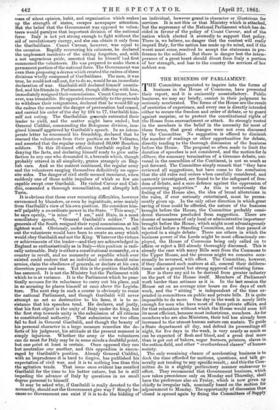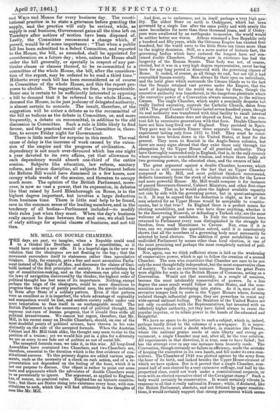THE BUSINESS OF PARLIAMENT.
THE Committee appointed to inquire into the forms of business in the House of Commons, have presented their, report, and it is eminently unsatisfactory. Public business, we may say briefly, cannot in their judgment be seriously accelerated. The forms of the House are the result of centuries of experience, and every one is directly intended either to secure the freedom and order of debate, or to guard against surprise, or to protect the constitutional rights of the House from encroachment or attack. So strongly rooted in the members is the belief in the necessity for most of these forms, that great changes were not even discussed by the Committee. No suggestion is offered to diminish the number of readings or other opportunities for debate, directly tending to the thorough discussion of the business before the House. The proposal so often made to limit the duration of speeches is not considered, and the motion for la cliiture, the summary termination of a tiresome debate, uni- versal in the assemblies of the Continent, is not so much as put forward. The Committee simply remark that "they have reviewed all suggestions, but have come.to the conclusion that the old rules and orders when carefully considered, and narrowly investigated, are found to be the safeguard of free- dom of debate, and a sure .defence against the oppression of overpowering majorities." As this is notoriously the feeling of the House also, the idea of broad alterations in the rules, if ever seriously entertained, must be perma- nently given up. In the only other direction in which great saving of time could be effected, the nature of the business brought before the House the Committee probably consi• dered themselves precluded from suggestion. There are dozens of measures of only local or administrative importance brought before the House, which might most advantageously be settled before a Standing Committee, and then passed or rejected in a single debate. There are others in which the business power of the Lords might be most efficaciously em- ployed, the House of Commons being only called on to affirm or reject a Bill already thoroughly discussed. This is already the case with many Bills sent from the Commons to the Upper House, and the process might we conceive occa- sionally be reversed, with effect. The Committee, however, if they discussed such matters at all, conceal their delibera- tions under a general but strong approval of existing forms. Nor is there any aid to be derived from greater industry on the part of the House itself. Members of Parliament work harder than artisans as it is. In the last session the House sat on an average nine hours on five days of each week, and the " sitting " is independent of the time ex- pended in committees on public and private bills. It is quite impossible to do more. One day in the week is surely little enough for men who have moat of them private affairs, and for that relaxation without which the House would soon kill its most efficient, because most industrious, members. As for members who are also Ministers, their toil has already been increased to the utmost human nature can sustain. To guide a State department all day, and defend its proceedings all night, for five days in the week, is very nearly as much as can be expected of flesh and blood, and a great deal more than is got out of bakers, sugar burners, printers, slaves in the cotton-field, and other " overburdened classes" of human society. The only remaining chance of accelerating business is to dock the time afforded for motions, questions, and talk ge- nerally not tending to any specific result, ; and this the Com- mittee do in a slightly perfunctory manner endeavour to effect. They recommend that Government business, which now takes precedence only on Monday and Thursday, shall have the preference also on Friday, which is now given up chiefly to irregular talk, nominally based on the motion for adjournment to Monday. The opportunity of discussion thus closed is opened again by fixing the Committees of Supply and Ways and Means for every business day. The consti- tutional practice is to state a grievance before granting the supply, and the practice will only be revived, while, as supply is real business, Government gains all the time left on Tuesdays after notices of motion have been disposed of. Lastly, the Committee recommend a change which, if passed, would b lie-of some importance " That when a public bill has been submitted to a Select Committee, and reported to the House, the bill, as amended, shall be appointed for consideration on a future day ; when, unless the House shall order the bill generally, or specially in respect of any par- ticular clause or clauses thereof, to be re-committed to a committee of the whole House, the bill, after the considera- tion of the report, may be ordered to be read a third time." Hitherto every such bill has been reconsidered as of course in Committee of the whole House, and this the report pro- poses to abolish. The suggestion, we fear, is impracticable. Some one is certain to be sufficiently interested in opposing a bill to demand that it be referred to the whole House, a demand the House, in its just jealousy of delegated authority, is almost certain to concede. The result, therefore, of the suggestion will be either a debate as to the recommittal of the bill as tedious as the debate in Committee, or, and more frequently, a debate on recommittal, in addition to the old discussion in Committee. Such a rule is little likely to find favour, and the practical result of the Committee is, there- fore, to secure Friday night for Government.
There is little matter for surprise in this result. The real cause of delay is the increase of work caused by the exten- sion of the empire and the progress of civilization. A dependency is not much over-favoured which has one night a year devoted to its own affairs, yet that allowance to each dependency would absorb one-third of the entire session. Subjects like education, law reform, sanitary reform, and prison discipline, all subjects Parliament before the Reform Bill would have dismissed in a few hours, now occupy whole weeks of the session, and threaten to occupy much more. The opinion of the British Parliament, more- over, is now so vast a power, that its expression, in debates like that raised by Lord Ellenborough on Rome, is in the highest degree important, but involves a large deduction from business time. There is little real help to be found, save in the common sense of the leading members, and in the tendency of all bodies—Parliament included—to modify their rules just when they must. When the day's business really cannot be done between four and one, we shall hear of early sittings for special classes of business, and not till then.































 Previous page
Previous page